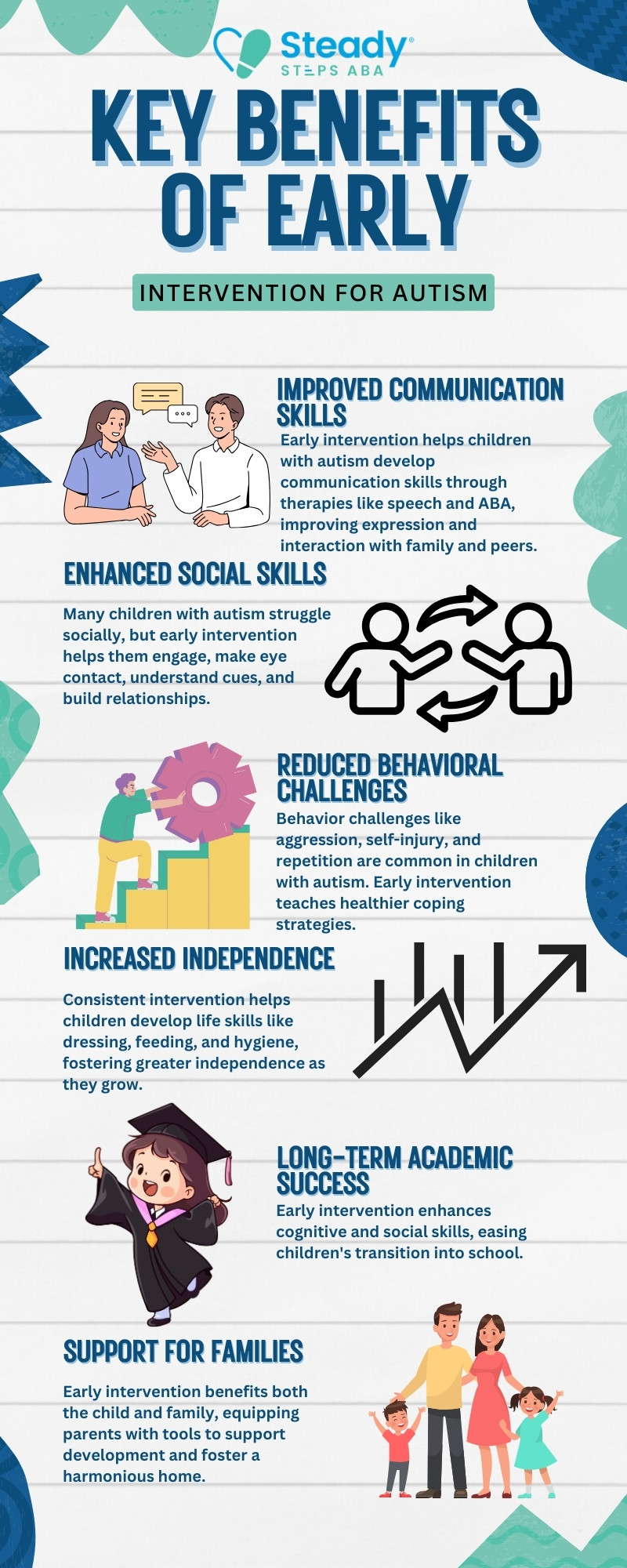Key Points:
- Early intervention for autism is vital for long-term development and growth.
- Research supports the effectiveness of early intervention in improving communication, social skills, and behavior.
- ABA therapy is a highly effective intervention that helps children with autism develop essential life skills.
Autism Spectrum Disorder (ASD) is a neurodevelopmental disorder that affects how diagnosed individuals interact with their peers and process information in the world around them. Because of this, parents often find themselves wondering: does early intervention help autism?
While it’s a lifelong condition, early intervention for autism has been shown to make a significant difference in the lives of children. The earlier a child receives support, the better their outcomes in key areas such as communication, social interaction, and behavior management.
Although early intervention plays a critical role in helping children with autism reach their full potential, research indicates that only about 47% of autistic children receive early intervention due to factors like inaccessibility to treatments.
In this article, we will explore the importance and benefits of early intervention for autism. We’ll delve into the types of interventions available and the positive long-term impact that early therapy can have on children with autism.
Does Early Intervention Help Autism?
Yes, early intervention helps autism by addressing developmental challenges before they become more ingrained. Children who receive early therapy, particularly in their preschool years, often experience substantial improvements in speech, socialization, and behavior. Early intervention allows for the best chance for autistic children to develop skills that will help them thrive in school, at home, and in social settings.
Particularly, interventions like Applied Behavior Analysis (ABA) therapy are proven to be effective when implemented early. ABA therapy focuses on teaching skills through reinforcement, shaping behavior, and providing a structured approach that helps children with autism acquire essential life skills.
What are the Key Benefits of Early Intervention for Autism?
When it comes to autism, the benefits of early intervention cannot be overstated. For children on the autism spectrum, starting therapy at a young age can significantly improve developmental outcomes. These benefits are particularly visible in areas such as communication, behavior regulation, and social skills.
Let’s look at some key benefits of early intervention for autism:

5 Types of Early Intervention Programs for Autism
There are various types of early intervention programs available, each designed to address different aspects of a child’s development. The key is to find an approach that works best for the child’s needs.
1. Applied Behavior Analysis (ABA)
ABA is one of the most widely used therapies for children with autism. It focuses on teaching positive behaviors and reducing negative behaviors through reinforcement. ABA therapy can be customized to each child’s individual needs, helping them to develop communication, social, and self-help skills.
2. Speech and Language Therapy
Many children with autism experience delays in speech and language development. Speech therapy helps children improve their verbal communication skills, including articulation, comprehension, and social communication.
3. Occupational Therapy
Occupational therapy focuses on helping children develop fine motor skills, sensory processing, and the ability to perform daily tasks like feeding, dressing, and writing. It’s particularly helpful for children with autism who may struggle with sensory issues or motor coordination.
4. Early Childhood Special Education
Early childhood special education programs provide individualized learning experiences for children with autism. These programs often involve a multidisciplinary team, including special educators, speech therapists, and occupational therapists, to ensure a well-rounded approach to a child’s development.
5. Social Skills Training
Social skills training focuses on helping children with autism develop appropriate social behaviors and improve interactions with peers. This can involve group therapy, role-playing, and teaching specific social rules such as turn-taking, sharing skills, and making eye contact.
When Should Early Intervention Begin?
The earlier the intervention, the better. Early identification and treatment can make a huge difference in the developmental trajectory of a child with autism. However, it’s important to note that intervention is beneficial at any age. Even if a child is older, starting therapy can still improve their quality of life and help them develop valuable skills. But earlier is always better in terms of giving the child the best possible chance for success.
How ABA Therapy Supports Early Intervention for Autism
An effective and evidence-based early intervention for autism is Applied Behavior Analysis (ABA) therapy. ABA helps by breaking down complex behaviors into manageable steps and teaches children through positive reinforcement. It helps children with autism learn skills at their own pace and rewards them for making progress.
ABA therapy is highly individualized, meaning that it can be tailored to each child’s unique needs. Whether the child struggles with communication, socialization, or behavior regulation, ABA therapy targets these areas to create meaningful improvements. The therapy can be used at home, school, or other environments to ensure that the child’s progress is consistent across different settings.
Ready to Get Started with ABA Therapy?
If you’re looking for a professional and compassionate ABA therapy provider for your child, Steady Steps ABA is here to help. Our team of dedicated therapists specializes in providing personalized ABA therapy for children with autism, helping them improve communication, social skills, and behavior.
Located in Maryland, Steady Steps ABA is committed to providing the highest quality care to children and families. Early intervention can make a significant difference in a child’s development, and we are here to guide you through every step of the process.
Contact us today to learn more about ABA therapy and start your child’s journey toward success!






